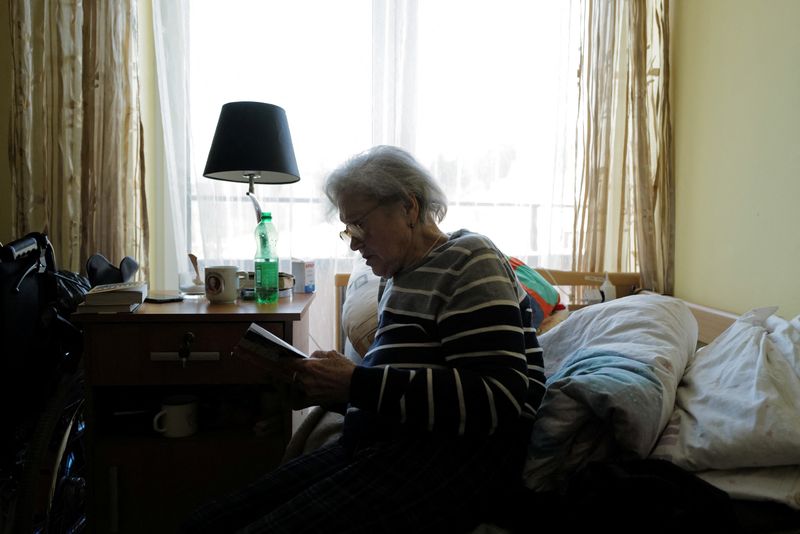By Agnieszka Pikulicka-Wilczewska and Kacper Pempel
GLOGOCZOW, Poland (Reuters) - Tamila Melnichenko, 82, has one last wish: to be buried in Ukraine. A year ago, she was uprooted by the Russian invasion and now spends her days in a retirement home in Poland, longing for the life she had to leave behind.
The former nurse reads Ukrainian and Russian classics and memorises poems or walks down the narrow corridors on her crutches to keep herself busy as the days slowly tick by.
Her thoughts constantly drift back to Ukraine where she lived all her life and raised her family.
"I'm old, I want to die there (in Kyiv). Now I don’t know where I will die," she told Reuters.
"I don't bother anyone, the staff here are very helpful, I receive warm meals. What else would an old person need?," she said in the sparsely furnished room in the home in Glogoczow, southern Poland, that she shares with two other refugees.
"But I want to go back to Ukraine."
(For a photo essay, click on )
She knows she could not have stayed in Kyiv. When air raid alerts went off, she was in her apartment on the fourth floor, alone and in a wheelchair. The widow and her only daughter, Oksana, decided to leave with Oksana's son.
A neighbour drove them to western Ukraine and then they took the train for the gruelling journey to Poland.
"We thought it was only for a month and we did not take anything with us. We even left unwashed dishes in the sink," Melnichenko said.
She spent the first few months in the house of a Polish family but because of her difficulties walking her daughter placed her in the retirement home, paid for by Polish social services. She has no idea how long she will have to stay there and whether she will ever go back to Ukraine.
More than 9 million Ukrainians - mostly women, children and the elderly - made a similar journey to Poland in the weeks and months after the invasion. Many have returned home, but around 1.5 million remain, according to Polish Border Guard estimates.
While social isolation and loneliness are part of the experience of exile, older people can be the worst affected.
Since the beginning of the war, 76,000 Ukrainians over the age of 60 have registered with the Polish authorities - necessary for refugees to access healthcare and benefits.
According to a report by the World Health Organization and Poland's General Statistics Office, nearly two-thirds of respondents over the age of 55 said they would benefit from support in dealing with a mental condition that affected their daily functioning.
SURVIVAL STRATEGIES
To cope with the strain, some, like Tatiana Potapova, 62, have tried to build ties within their new communities.
In Krakow, Potapova attends Polish language classes at the local Zustricz foundation, which also organises get-togethers of Ukrainian and Polish pensioners who seek a new sense of belonging.
This keeps her going.
Potapova used to work in the Kharkiv Institute of Medical Radiology as a chemist. On Feb. 24, the day the war began, her hometown of Slabozhensky near the Russian border fell under Russian occupation and Potapova and her family could no longer travel to areas under Ukrainian control.
"It was impossible to leave the house, it was scary, Russians were checking everyone ... Two pharmacies were plundered," she recalled.
But Potapova's daughter, who has diabetes and uses a wheelchair, needed medicine, while her grandson showed symptoms of trauma. In the end, she said they had no choice but to leave, fleeing through Russia and Estonia to Krakow, where her elder daughter lives.
Russia denies intentionally targeting civilians in what it calls a "special military operation" to protect Russian security. Kyiv and its allies call Russia's actions a land grab.
Potapova's younger daughter spends most days in a hospital for treatment while she takes care of her grandson, taking him to school, to the swimming pool, or to therapy.
Finding work is hard. She initially got a few cleaning jobs but the offers soon stopped coming. People over 60, she says, are not in demand in the labour market.
"I find joy in learning Polish ... But I miss my job, I felt confident there. Here I constantly worry. Today is good, but what will happen tomorrow?"
This uncertainty, which drains her energy, is shared by many refugees, even those who are surrounded by their family.
Svitlana Skibina, 62, left Kharkiv last April with her disabled husband, her son, daughter-in-law and granddaughter.
Skibina, who now lives in Warsaw, worked in a library at a medical college. But there are few options for her in Poland.
"For the first two months I had a terrible depression, I didn't want anything. I only wanted to go home," she said.

Skibina has not given up. She attends Polish language classes in the LIFE centre run by the Pentecostal church, and on weekends goes to mass. But she is haunted by guilt. She left, while many of her friends in Kharkiv continue to suffer.
"The pain does not go away. Will we ever go back? I would like to help to rebuild my town, but will I have enough strength?"